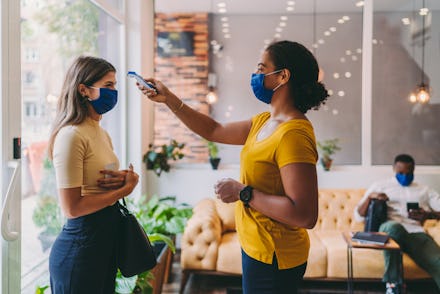Are temperature checks really going to save us from coronavirus?

As more cities reopen, some of us are skittishly dipping our toes back into public life while others seem to be diving right in. Our differing approaches to interacting safely are creating some confusion about how to socialize. In an effort to keep patrons safe and also bolster business, a lot of restaurants are embracing mandatory pre-entry temperature checks. But experts disagree about the usefulness of using temperature checks to curb the spread of coronavirus. It begs the question: Are all these thermometers really going to save us?
In some places, checking for fever — one of the most common symptoms of COVID-19 — are becoming mandatory. In New York, for example, fever checks are one of the conditions Governor Andrew Cuomo set for New York City restaurants that plan to reopen later this month for indoor dining, the New York Times reported. But while most experts agree that some of the other conditions make sense in terms of safety — getting patron’s contact info for contact tracing purposes, as well as limited seating — many are dubious about the effectiveness of fever checks as a method for keeping infectious people out of shared spaces.
So why are we asking everyone to invest in expensive and potentially inaccurate thermometer guns? It might be because fever checks make us feel safer. David Thomas, an infectious disease specialist at Johns Hopkins University School of Medicine, told the Times that doing temperature checks is akin to checking the oil in your car before you go on a road trip. “It makes you feel better, but it’s not going to keep you from wrecking the car or prevent the tires from falling off. It’s not going to make your trip any safer.” In other words, fever checks won’t likely sieve out people with coronavirus, but it’s an important gesture. It sets a standard and well, it can’t hurt..
“Symptom-based screening has limited effectiveness because people with Covid-19 may have no symptoms or fever at the time of screening, or only mild symptoms,” the Centers for Disease Control and Prevention (CDC) said in a statement about screening air passengers, which, arguably, are packed in like sardines and therefore at greater risk. If temperature checks aren’t a good way to vet people for air travel, why should they be used in any other public space?
Ultimately, fever checks may not be effective in preventing spread once people are out in public, but they could make people reconsider being in public spaces altogether, and that sends an important public health message. “It makes people think twice, and reminds them that this is a big deal, we still need to be careful, you need someone to stand by the door to do that,” Thomas McGinn, senior vice president and deputy physician-in-chief at Northwell Health, told the Times.
While most people who feel feverish will probably stay home anyways, McGinn added, temperature checks could catch the gung ho foodie few who won’t cancel their dinner plans just because they have symptoms of a highly infectious disease that is killing hundreds of thousands of people. I wish we didn’t need protection from that kind of folly, but honestly, we might. So while I lament the absurdity of unnecessary precautions at the noodle shop, I will also happily bow my head and comply.